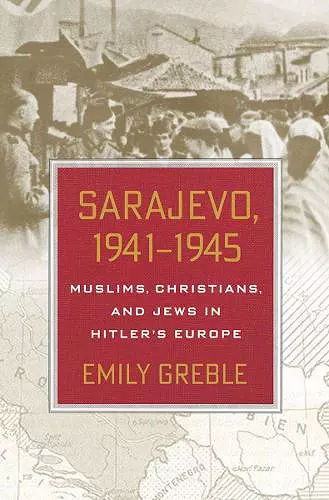Sarajevo, 1941–1945
Muslims, Christians, and Jews in Hitler's Europe
Format:Hardback
Publisher:Cornell University Press
Published:25th Feb '11
Currently unavailable, and unfortunately no date known when it will be back

There is much to commend this study. Emily Greble capitalizes on a recent historiographical trend which prioritizes the local to observe the national and international.... Greble has contributed an important study which should be useful to others researching the war years in the region. ― Journal of Jewish Studies
On April 15, 1941, Sarajevo fell to Germany’s 16th Motorized Infantry Division. The city, along with the rest of Bosnia, was incorporated into the Independent State of Croatia, one of the most brutal of Nazi satellite states run by the ultranationalist Croat Ustasha regime. The occupation posed an extraordinary set of challenges to Sarajevo’s famously cosmopolitan culture and its civic consciousness; these challenges included humanitarian and political crises and tensions of national identity. As detailed for the first time in Emily Greble’s book, the city’s complex mosaic of confessions (Catholic, Orthodox, Muslim, Jewish) and ethnicities (Croat, Serb, Jew, Bosnian Muslim, Roma, and various other national minorities) began to fracture under the Ustasha regime’s violent assault on "Serbs, Jews, and Roma"—contested categories of identity in this multiconfessional space—tearing at the city’s most basic traditions. Nor was there unanimity within the various ethnic and confessional groups: some Catholic Croats detested the Ustasha regime while others rode to power within it; Muslims quarreled about how best to position themselves for the postwar world, and some cast their lot with Hitler and joined the ill-fated Muslim Waffen SS.
In time, these centripetal forces were complicated by the Yugoslav civil war, a multisided civil conflict fought among Communist Partisans, Chetniks (Serb nationalists), Ustashas, and a host of other smaller groups. The absence of military conflict in Sarajevo allows Greble to explore the different sides of civil conflict, shedding light on the ways that humanitarian crises contributed to civil tensions and the ways that marginalized groups sought political power within the shifting political system. There is much drama in these pages: In the late days of the war, the Ustasha leaders, realizing that their game was up, turned the city into a slaughterhouse before fleeing abroad. The arrival of the Communist Partisans in April 1945 ushered in a new revolutionary era, one met with caution by the townspeople. Greble tells this complex story with remarkable clarity. Throughout, she emphasizes the...
Emily Greble has written an enthralling history of Sarajevo under Nazi occupation, contributing very usefully to the histography of World War II and the former Yugoslavia. Mastering a wealth of archival sources and focusing specifically on Bosnia and Herzegovina's capital, Greble argues that a unique sense of community helped the city pull together and persist through the hardships of one of the worst ordeals in its history.... Greble’s book can serve as an inspiring template for future studies of cities in wartime.
-- Christian Axobe Nielsen * Austrian History Yearbook *Greble's book quietly takes on a much larger subject than is immediately apparent. Groups that have dominated accounts of Yugoslavia's war years are absent here.... Greble offers a different setting and new leading men.
* London Review of Books *In addition to enriching our understanding of Sarajevo and of Yugoslavia during World War II, Greble's analysis adds to a growing historiography challenging the idea that nationality overshadowed other loyalties in early twentieth-century East-Central Europe.. This excellent study uses rich archival research to describe a complex situation in a nuanced and accessible way. It is an important contribution to the literature on Yugoslavia during World War II, and will be of broad interest to the scholars of East Central Europe, European nationalisms, and the Nazi Empire.
-- Caitlin E. Murdock * Canadian Journal of History *The result of painstaking work in the archives of the former Yugoslavia, this study of Sarajevo under the Ustasha dictatorship is essential for scholars with an interest in Yugoslav history, World War II, fascism, ethnicity, and community studies. How, Greble asks, did the cultural elites of Sarajevo attempt to secure autonomy for their communities—Muslim, Jewish, Catholic, and Orthodox—in a time of dictatorship and war?... Treating her subjects with great sensitivity and showing a keen eye for telling details, Greble compellingly demonstrates 'the persistence of a civic community spirit' during these difficult years. Summing Up: Highly recommended.
* Choice *There is much to commend this study. Emily Greble capitalizes on a recent historiographical trend which prioritizes the local to observe the national and international.... Greble has contributed an important study which should be useful to others researching the war years in the region.
-- Hannah Holtschneider * Journal of Jewish Studies *Emily Greblo's Saravejo is an elaborately detailed portrayal of Sarajevan's wartime experience It is an absolutely significant contribution to the literature and a must-read for those who are interested in Balkan history in general and Saravejo in particular.
-- Elif Zaim * Insight Turkey 18ISBN: 9780801449215
Dimensions: 235mm x 155mm x 24mm
Weight: 907g
296 pages